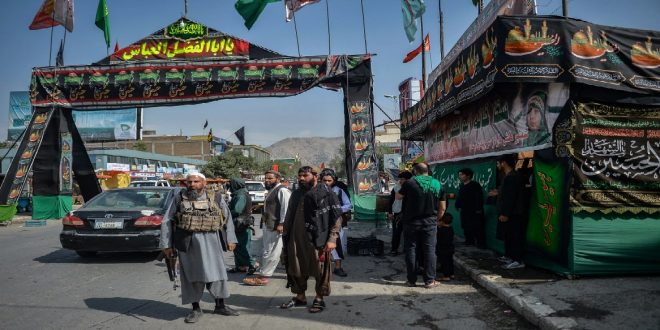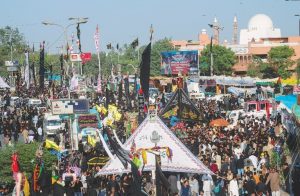19-08-2021
By SJA Jafri + Bureau Report + Agencies
KARACHI/ KABUL/ LAHORE: For the last 20 years, the Kartei Sakhi shrine in west Kabul has been one of the main gathering places for the annual Ashura commemorations in the city.
Every year, thousands of men, women and children in black robes and green headbands would come to this shrine to honor what they consider the martyrdom of Imam Hussein, the grandson of the Prophet Muhammad.
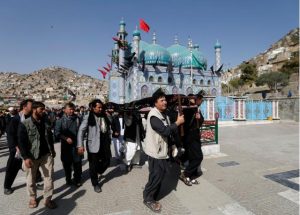 This year, Ashura falls on the fifth day of Taliban rule in Afghanistan, the hilltop the blue-domed shrine sits on is barren.
This year, Ashura falls on the fifth day of Taliban rule in Afghanistan, the hilltop the blue-domed shrine sits on is barren.
What used to be a sea of people walking from the courtyard to the shrine is now only a few hundred stragglers.
The streets leading to the shrine, including from Kabul University, used to be shut to traffic as masses of people holding banners reading: “Ya Hussein” made their way up the hill and into the shrine.
Sayed Yusuf, an elder from the community, says he and other elders have been reassured by the Taliban that nothing would happen and that no one should fear coming to the shrine this year.
“They told us that if anyone bothers or harasses us to tell them,” he said standing near a security check that in years past would be swarmed with people waiting to be patted down before entering the courtyard itself.
At 9am on Thursday (4:30 GMT), it was empty. With nobody lining up to enter, the teenagers conducting the security checks were left to play with their mobile phones.
On the road leading up to the shrine, another teen checks cars and hands them receipts for parking near the entrance doors.
Assurances like the Taliban’s are important to the Shia community, who in recent years have been the targets of vicious attacks claimed by ISIL (ISIS), including assaults during previous Ashura commemorations. At least 18 people were killed after a gunman opened fire on Shia mourners at the Sakhi shrine in 2016.
Further, when the Taliban first ruled Afghanistan from 1996 to 2001, they were accused of massacres against the nation’s Hazara ethnicity, who make up the majority of Afghanistan’s Shia population.
This year, however, the group was very careful not to create the impression of sectarian divide, and attendees in Kartei Sakhi said the Taliban have left them to themselves on this day.
When the Taliban first arrived in Kabul, the city was already full of Ashura flags, banners and gateways, all of which remained standing.
During their five-year rule, it would have been unthinkable to erect such things in public. Likewise, on Tuesday, members of the armed group attended a ceremony with Shia worshippers in remembrance of Imam Hussein.
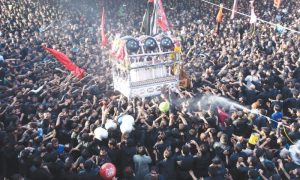 Having presented themselves as a religious authority, the group is also careful to avoid the religious blunders for which former President Ashraf Ghani repeatedly faced criticism and ridicule.
Having presented themselves as a religious authority, the group is also careful to avoid the religious blunders for which former President Ashraf Ghani repeatedly faced criticism and ridicule.
Most notably, in 2015, when Ghani referred to Hussein as “the grandson of God”.
“They’re here, but they said they will leave us to ourselves and to call if we need help,” said Najibullah, an attendee who is also working as extra security. He said though he has been going out since Monday, the first day of Taliban rule, others are still uncomfortable returning to normal life.
“It will take time, but slowly things are returning to normal,” he said sitting by the entrance to the shrine. He says he has moved around the city for the last few days and has never been stopped or harassed something that would have been much less likely when the group first ruled over the country.
‘Wait until they get comfortable’
Rahmatullah, another attendee standing nearby, says people should not be so quick to breathe a sigh of relief just yet. Though he was barely a teenager when the Taliban were first in power, he looks back at that experience to assess this week.
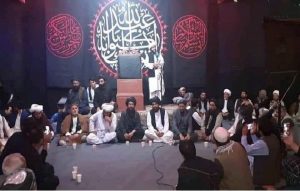 “Wait until they get comfortable. Last time, things were good for about two weeks and then they did what they wanted.”
“Wait until they get comfortable. Last time, things were good for about two weeks and then they did what they wanted.”
He was referring to the Taliban’s strict interpretation of Islam that dictated all aspects of life in Afghanistan for five years.
Najibullah agrees, but wants to be hopeful.
“There are reports on Facebook, but so much of what’s posted online is just rumors.”
One of those reports was the alleged tearing down of Ashura banners in Kandahar, reportedly by the Taliban.
Najibullah says if things can carry on as they are now, he would be happy.
“We’re stuck with them now, but if women can continue to work and don’t have to cover fully in the chadari [burqa], then that’s good.”
At a press conference on Tuesday, Taliban spokesman, Zabihullah Mujahid, said: “Women are going to be very active in the society but within the frameworks of Islam. Women are a key part of society and we are guaranteeing all their rights within the limits of Islam.”
He also spoke out against the media potentially trying to divide the Afghan people, “When it comes to ethnic differences, religious differences and hostilities, they should not be promoted by the media, who should work on the country for the unity of the nation to have peaceful brotherly coexistence.”
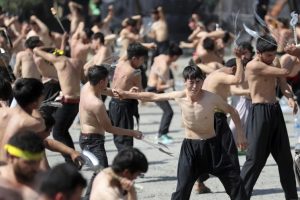 This likely could have been a reference to the Facebook reports both men were referring to.
This likely could have been a reference to the Facebook reports both men were referring to.
Rahmatullah warns his friend again to temper his optimism. “Of course, we hope it stays like this, but history is not on their side.”
He points to the fact that in years past, even with the threat of attacks by ISIL and Pakistani armed groups, there would have been thousands of people gathering at the very spot they were standing.
“It’s not about today, it’s about the future. Until people feel assured about their future, who’s going to go outside even for Ashura?”
Meanwhile, Millions took to streets in different countries of the world on Thursday marking the tenth day of Muharram, the day when Imam Hussain (Alaihiss Salam/AS), the grandson of Prophet of Islam Hazrat Muhammad (PBUH) was martyred more than 14 centuries ago while, the Ashura would be observed in India, Australia and many other countries on Friday, hundreds of thousands commemorate the martyrdom of Imam Hussain, as they took part in Ashura marches.
A massive procession took place in Beirut’s southern suburb, while in Iraq, over 40 millions in Karbala mark Ashura despite the security threats by extremists.
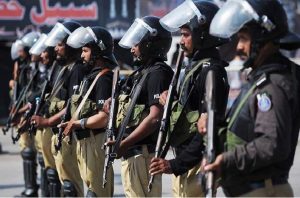 Meanwhile, in Iran, millions took to streets in Tehran and several other provinces to mark the Martyrdom of Imam Hussein (pbuh) the year 61 AH of the Islamic calendar.
Meanwhile, in Iran, millions took to streets in Tehran and several other provinces to mark the Martyrdom of Imam Hussein (pbuh) the year 61 AH of the Islamic calendar.
Also in Yemen, thousands participated in Ashura march in Saada, south, where Houthi leader delivered a speech addressing crowds.
Authorities on Sunday tightened a month-long security lockdown in Indian Kashmir’s main city of Srinagar after breaking up religious processions by Shia Muslims who defied a ban.
Shia Muslims worldwide stage processions and holds rallies during Muharram, the first month of the Islamic calendar which started on 1 September this year to mark the anniversary of the death of a grandson of the Prophet Muhammad (PBUH).
Most such processions have been banned in Indian-administered Kashmir since the outbreak of insurgency against New Delhi’s rule in 1989, on grounds that the rituals could be used to stoke anti-India sentiment.
Thousands of Afghan Muslims, mostly Shiite sects observed Ashura to pay homage to Imam Hussain (AS) and his 72 comrades who were martyred in Karbala of Iraq about 1400 years ago.
 Pressmediaofindia
Pressmediaofindia
